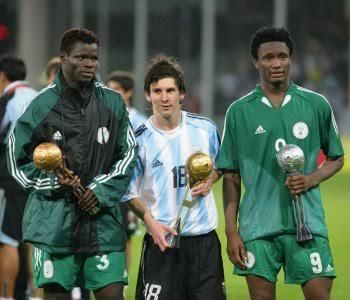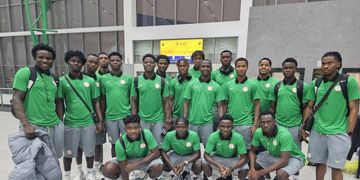As Nigeria's football history is replete with talented players, it is a daunting task to select the greatest eleven from the country's participation in the FIFA U20 World Cup.
However, after careful consideration and analysis of their performances, a formidable team emerges, showcasing the brilliance and skill of Nigerian football.
This team, consisting of players who left an indelible mark on the tournament, represents Nigeria's Greatest XI at the FIFA U20 World Cup.
Goalkeeper: Ambrose Vanzekin
In goal, Ambrose Vanzekin stands tall as Nigeria's number one goalkeeper during their silver-winning adventure at the Netherlands in 2005.
Throughout the tournament, Vanzekin displayed exceptional shot-stopping abilities, keeping four clean sheets and only succumbing in the final to two Lionel Messi penalties. His performances were instrumental in Nigeria's memorable campaign.
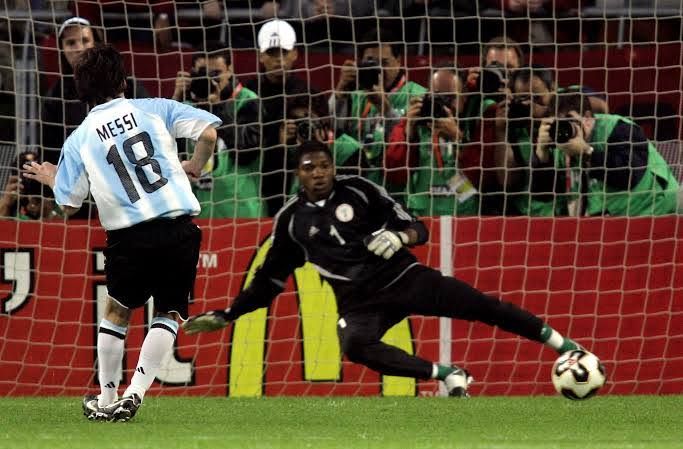
Defenders: Taye Taiwo, Dele Adeleye, Efe Ambrose
The defensive trio comprises Taye Taiwo, Dele Adeleye, and Efe Ambrose, each demonstrating their defensive prowess and tactical awareness.
Efe Ambrose, a stalwart in Nigeria's defence at the 2007 U20 World Cup in Canada, spearheaded a backline that remained impenetrable in the group stage.
Although they eventually bowed out in the quarterfinals against Chile, Ambrose's resolute defending in the earlier matches was commendable.
Dele Adeleye's calm and composed playing style made him the standout star in Nigeria's defence at Netherlands 2005.
Alongside his defensive partners, Adeleye contributed to Nigeria's formidable defensive record, making it challenging for opposition teams to breach their backline.
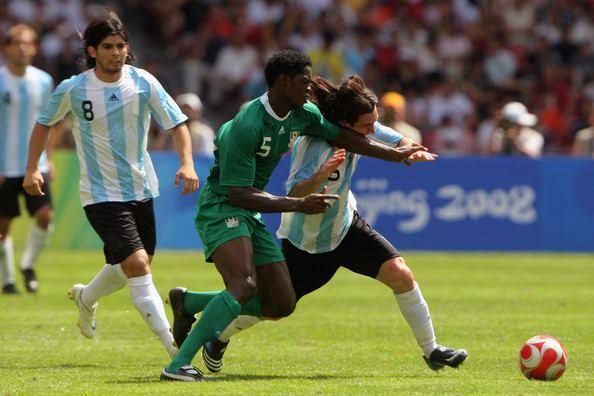
Taye Taiwo, renowned for his defensive solidity, also showcased his attacking prowess by scoring vital goals throughout the tournament. His impactful performances earned him recognition as the third-best player in the competition, behind only Argentina's Lionel Messi and John Mikel Obi.
Midfielders: Sani Kaita, Mutiu Adepoju, John Mikel Obi, Ahmed Musa
The midfield is where Nigeria truly excelled, boasting an array of talented players.
Sani Kaita, Nigeria's defensive midfielder at the Netherlands 2005, perfectly complemented John Mikel Obi.
Kaita's effectiveness, hard work, and tireless engine allowed Nigeria to keep several clean sheets during their impressive campaign.
Mutiu Adepoju, a highly influential figure in Nigeria's squad at the 1989 U20 World Cup, displayed exceptional talent by scoring crucial goals, including a brace that propelled Nigeria past the United States in the semifinals.
His performances caught the attention of Real Madrid, who subsequently acquired him for their youth team, showcasing his immense potential.
John Mikel Obi, widely regarded as one of Nigeria's greatest footballers, was the hero for the Flying Eagles on their road to the final of the 2005 edition.
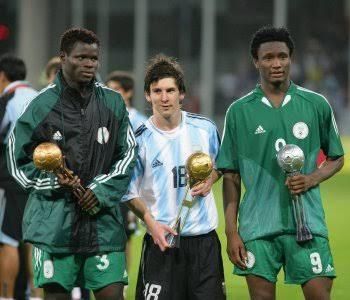
His leadership and technical prowess were instrumental in Nigeria's success. Mikel Obi's performances were acknowledged with the honour of being named the tournament's second-best player, a testament to his outstanding contributions.
Completing the midfield is Ahmed Musa, who played a pivotal role in Nigeria's 2011 campaign in Colombia. Musa's speed, skill, and clinical finishing ability made him an unstoppable force.
Despite Nigeria's unfortunate exit in the quarterfinals against France, Musa's contributions were undeniably significant.

Strikers: Chinedu Ogbuke, Monday Odiaka, Christopher Ohenhen
Leading the line are Chinedu Ogbuke, Monday Odiaka, and Christopher Ohenhen, all of whom left an indelible mark on the U20 World Cup.
Ogbuke's ability to find the back of the net stood out among Nigeria's impressive forward lineup in the Netherlands in 2005, scoring crucial goals, including a stunning consolation strike in the final against Argentina.
Monday Odiaka's heroics in the 1987 World Youth Championship in the Soviet Union also cannot be overlooked.
Odiaka's goal-scoring prowess was evident as he found the back of the net in every match Nigeria won, including notable victories against Canada, Australia, and Mexico in the quarterfinals.
His contributions were instrumental in guiding the Flying Eagles to a commendable third-place finish.
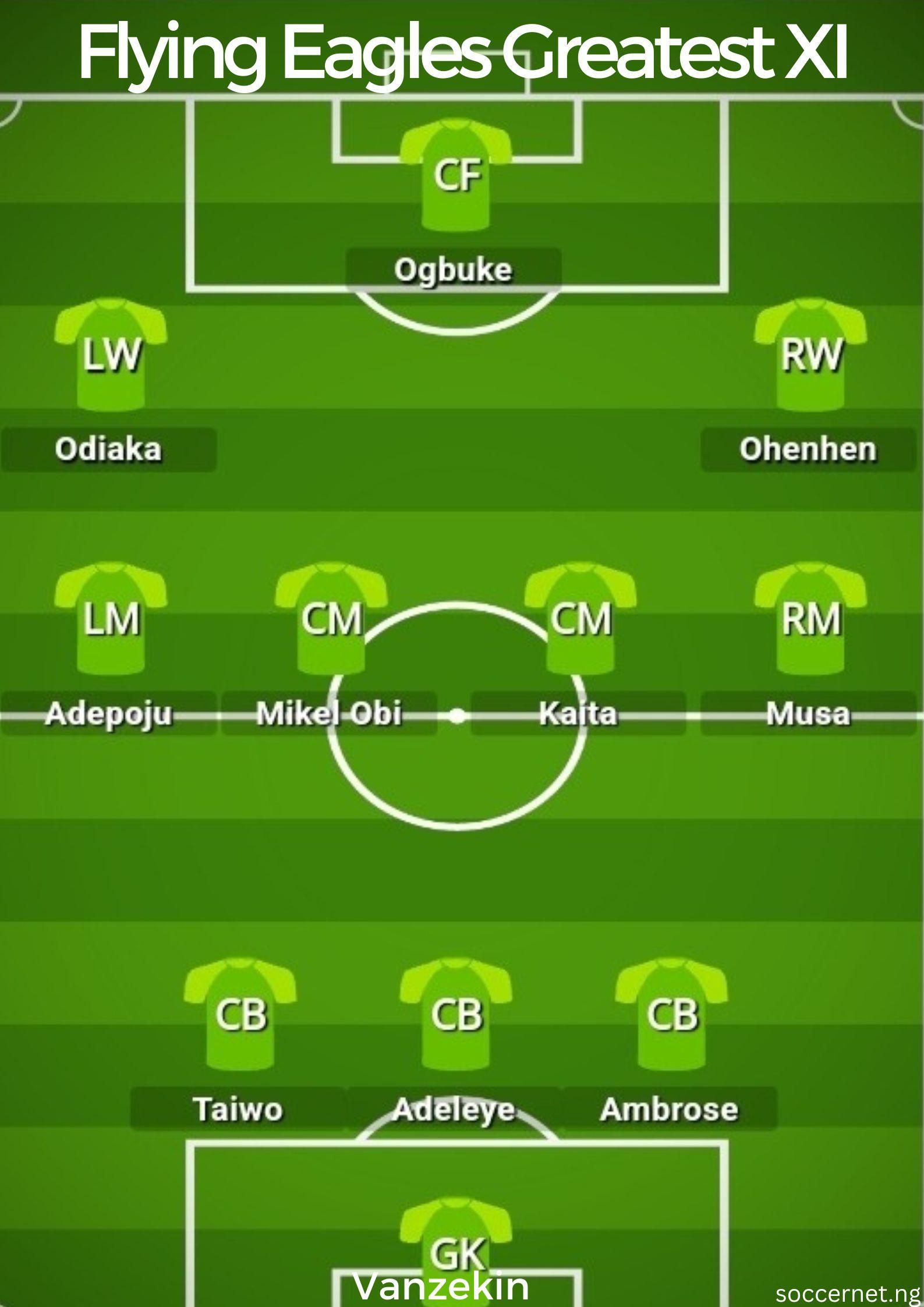
Christopher Ohenhen, another standout forward, etched his name in Nigerian football history during the Saudi Arabia 1989 edition.
Ohenhen's goal-scoring heroics were extraordinary, particularly in the quarterfinals against the Soviet Union.
Down 4-0, Ohenhen bagged a brace in the “Miracle of Dammam,” as Nigeria fought back to draw 4-4, marking the first-ever comeback from a four-goal deficit in a FIFA World Cup match at any level.

